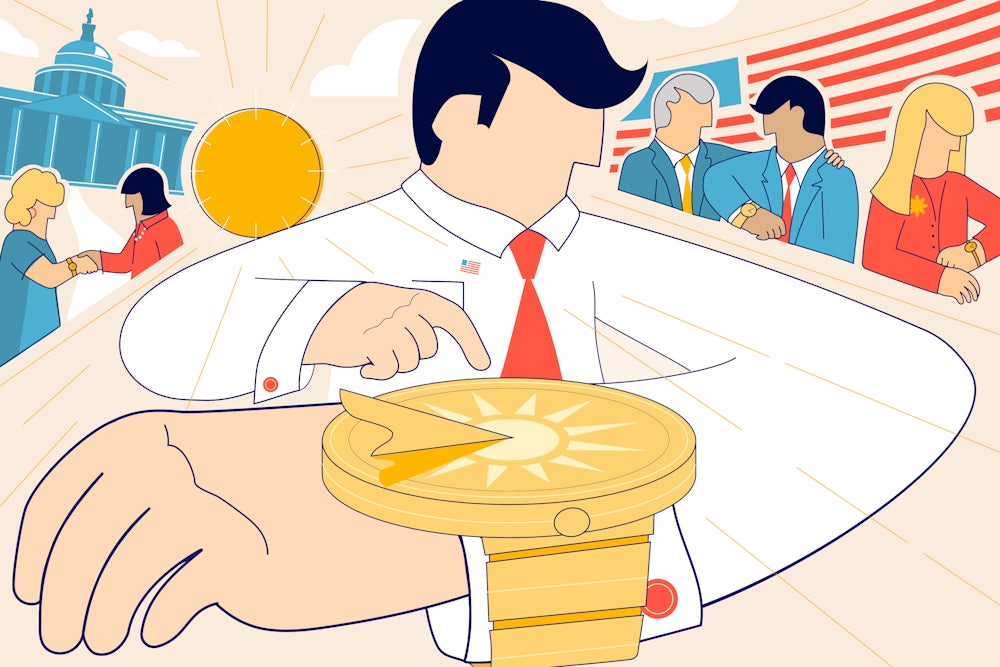When the Sunshine Protection Act sailed through the Senate this March, everyone was shocked. In a deadlocked Congress that has passed almost nothing, how did a bill about daylight saving time, of all things, make it through? On episode 46 of The Politics of Everything, hosts Laura Marsh and Alex Pareene explore what exactly happened in the upper chamber and look into America’s chaotic history of changing the clocks. What does DST’s success demonstrate about how our country does politics? Guests include the political scientist Ed Burmila, who’s previously appeared on the show, and the journalist Paul McLeod, who wrote about DST for Buzzfeed News.
Laura: On March 15 this year, the Senate passed an unusual bill. Senator Ed Markey was one of its sponsors.
[News clip] Ed Markey: The Senate just passed daylight saving time to make it year round. We’re walkin’ on sunshine!
Laura: The Sunshine Protection Act would eliminate the ritual of changing the clocks twice a year. No more springing forward and falling back, no more losing an hour of sleep in March and gaining one in November.
Alex: We could do a whole show debating the merits of a switch to permanent daylight saving time.
Laura: The change raises lots of good questions: Would it throw off our body clocks to change the time permanently, or is it the most rational way to make use of the daylight?
Alex: But that’s not the debate we’re going to get into today—for the most part. Because the way the Sunshine Protection Act passed is even stranger than the idea of changing time itself. Most politicians weren’t prepared for it. Even some senators didn’t know it was happening. It’s an issue people have strong feelings on but it doesn’t divide clearly along party lines.
Laura: Today on the show, we’re talking about daylight saving time and what it tells us about the American political system. I’m Laura Marsh.
Alex: And I’m Alex Pareene.
Laura: This is The Politics of Everything.
Laura: We’re talking about daylight saving time and the Sunshine Protection Act, a bill that would make daylight saving time permanent. It was recently passed in the Senate with unanimous consent. Paul McLeod, a politics writer for Buzzfeed News, recently wrote about the bill’s surprising success. Paul, thanks for coming on the show.
Paul McLeod: Happy to be here.
Laura: You wrote about the ins and outs of this. Why was everyone so surprised that the Sunshine Protection Act passed?
Paul: Well, because things typically don’t pass the Senate. It’s not an institution that is known for efficiency of governance. This is a chamber where bills go to languish and die a slow death. So on a random Tuesday, when something of any importance actually slid through without any issue, a lot of people were quite stunned. I was immediately suspicious, which is why I started asking people about what happened. It turns out that this was a bit of a mistake. Even the senators I talked to—none of them expected this to happen.
Laura: Just explain unanimous consent for us. Typically, the Senate has to vote on bills and they have to get 60 votes, right? Unanimous consent is a different process.
Paul: Most people don’t even know about unanimous consent because nothing controversial ever gets passed through unanimous consent. Really, it’s basically what it sounds like: a Senator can get up in the chamber and say, “Hey, is it unanimous that we all agree that all of the debate is waived, all of the votes are waived, and we can just pass this bill as it is?” If no one objects then it’s done, but all it takes is a single senator to say, “No, no, no, I object,” and the bill goes nowhere. For something like daylight saving time, around which there is a lot of debate and disagreement and there are people who fully oppose it, it was unlikely that this unanimous consent was going to succeed.
Laura: To get a sense of what unanimous consent is used for, what kind of bill would we typically expect to see passed this way?
Paul: There’s two answers to that. The first answer is things that are important to someone’s state that are fairly unobjectionable—minor things. The second is that, actually, some of the most important pieces of legislation that go before the Senate get involved in unanimous consent. They’ll be working out these last minute deals to, say, fund the entire government. By the time they’re done working this out in the back rooms there’s not enough time to go through the full process, so what they’ll do is use unanimous consent to fast-track the process. This is why if you ever hear of, say, Rand Paul causing a five-day government shutdown and you think, “Well, how can one senator do that?” that’s what’s happening: Both parties have agreed on a spending bill, they need to use unanimous consent to get it done quickly, and one Senator is blocking it to make a political point.
Alex: So the two things that it’s used for are a proclamation congratulating a senator’s hometown sports team, or funding the entire United States government. Those are typically the two things it’s used for.
Paul: The Schoolhouse Rock! version of bills getting studied and then going through debates is not typically what happens. Usually the only things that get passed are passed when you have agreement between the parties, or at least enough of the parties to get to 60 votes, and then it’s ferried through. Often you’ll have a bill renaming a post office or something, and then at the last moment they will pretty much copy and paste huge pieces of important legislation onto that—it’s called a legislative vehicle—and then they’ll pass it within a day. It’s just a very distorted version of what the original intention of the Senate was.
Alex: Given the way unanimous consent works, and given the way the Senate doesn’t work, it raises this question: Why wouldn’t Bernie Sanders wait until all the Republican senators are asleep, and most of the Democratic senators are asleep, and go to an empty Senate and say, “I ask to pass Medicare for All by unanimous consent”?
Paul: There are two answers to that. The first is that the convention of the Senate has long been that, out of respect, you give every senator notification so that they have the opportunity to object, so that unanimous consent truly is unanimous. The more accurate answer, though, is that as soon as one senator does this—as soon as one senator goes in and sneaks something through—both parties are now going to have to have babysitters. They’re going to have people doing round-the-clock shifts in the Senate to make sure that no one goes in and tries to slip anything through unanimous consent. These are senators; they don’t want to do that. They want to be out fundraising and going to press releases. There’s this agreement that no one tries it. In fairness, getting something through the Senate is not passing it into law. It still needs to go through the House. It still needs to be signed by the president. It’s not even a guarantee that it would work anyway.
Alex: Is that what happened in this case?
Paul: Not exactly, because Marco Rubio—one of the two senators from Florida, where this is a very popular provision—had announced that he was going to bring this up for unanimous consent. He had run what’s called a hotline, which is where you notify every of the other 99 senators that are going to be doing it. Sure enough, one senator objected. Roger Wicker of Mississippi said, “No, I think that kids are going to be going to school in the dark, and they’re going to be getting hit while they’re waiting for the school bus, and I’m going to object to this.” In fact, they even bumped it back a day because Roger Wicker’s flight was delayed so he couldn’t object on Monday. Marco Rubio agreed to move to Tuesday so that Wicker could object. He brought it up to the floor of the Senate, and Roger Wicker was nowhere to be found—and no one else objected either. Even Kyrsten Sinema, who was serving as the chair at the time, was stunned, then broke out into this huge smile and started fist pumping when it actually passed. The bill’s sponsors went through the proper procedure, but what it seems happened is that (1) a bunch of people assumed someone else was going to object, and (2) a bunch of staffers just never told their bosses. I talked to some people who were in favor of it, and they had no idea what’s happening. I talked to Rick Scott—the other Florida senator—who was a huge proponent of permanent daylight saving time. He told me that if he had known he would have gone to the floor of the Senate and given a celebratory speech, but he had no idea what’s happening.
Alex: What a way to run a country.
Laura: Why do you think those staffers didn’t tell their bosses? Did they see this daylight saving thing and think, “This is on the level of renaming a post office—I don’t need to inform the person I work for about this”?
Paul: That’s basically what happened. Things get hotlined all the time, people throw up flyers all the time, and it seems that some of the legislative directors in these Senate offices essentially do a bit of triage, where they don’t bother their boss with everything. I talked to Senator Chris Coons of Delaware, and he said that’s what happened in his office. His staff got this hotline for daylight saving time, they had never heard him talk about it once and figured he didn’t care, so they didn’t even tell him. He’s saying this to me and goes, “In fairness, I don’t know if I do! I don’t know if I’ve had an opinion. I’ve never stopped to think about it.” What I heard was that Tom Cotton of Arkansas is very opposed to permanent daylight saving time and would have objected, but his staff didn’t tell him and that he was pretty outraged afterwards and is now trying to work with Republicans in the House to get it killed there.
Laura: Do you have a sense of the people who do care one way or another—how they line up on this? Why does Tom Cotton hate this, and why are the Florida senators so in favor?
Paul: It’s really all over the place. This does not fit into a typical blue-versus-red spectrum. There was a House committee study on it a few weeks ago, and politicians from both sides seemed kind of open to it; no one really seemed to have hugely set in stone, hard political beliefs one way or the other. It just depends on the geography. For Marco Rubio in Florida, if you’re in Miami you get a lot of daylight there, so you’re less affected by bumping back the hour during the winter months because you’re still able to get light in the morning when most people are going to work out and going to school. If you’re in North Dakota, well, it’s kind of flipped, where you might be going to school in the darkness regardless, so then that hour isn’t going to make a difference. People come down all across the spectrum depending on where their states are.
Alex: You said that Cotton was trying to work with House Republicans on this, but it’s funny because it’s not something where there’s a natural partisan divide. It’s going to be up to what individual members think, right?
Paul: Yeah, it is that rare issue where they don’t have marching orders in the same way.
Laura: This obviously took everyone by surprise, and now it’s going to go to the House at some point. What do you see happening next? I mean, what do you think the prospects are in the House, and when are they even going to vote on this?
Paul: It’s a fascinating question and one I don’t really know the answer to. I think that nothing is going to happen quickly. I think the House will take some time to study this. This is such a reversal of the normal way things work, where the House gets to pass whatever it wants knowing that the Senate is going to block it. Now the House really gets to be in the driver’s seat here and feel like they’re in control for once.
Laura: If you had to predict one way or the other, do you think this will pass or do you think it will die in the House?
Paul: Oh man. I think I will put my chips on it passing. I’d say there’s like 60–40 odds; it’s far from a slam dunk. I’m also interested in what’s going to happen now with unanimous consent, because this could go one of two ways: Either they could embolden people to try this more often, maybe the senators open up to the idea of passing things through unanimous consent more; or what will probably happen is a bunch of legislative directors get screamed at by their bosses and they tighten their ships to make sure that this never happens again, and nothing is able to slip by the same way that Marco Rubio was able to do this.
Alex: Well it’s funny this happened because the central fact about senators—that seems universal—is that they hate being on the floor of the Senate and will do anything possible to avoid that. I think you’re right. This is not going to convince them that they need to spend more time on the floor of the Senate, it’s going to convince them that they need to make unanimous consent harder.
Paul: Yes. I mean, look, the Senate is really an institution that is designed to block legislation. As long as I’ve been covering it, the thing that has been the most eye-opening to me is just how every incentive is to obfuscate. For something like this to happen—again, it’s really quite surprising to see something sail through the Senate. That just is not how this normally works.
Laura: Thanks so much for filling us in on all of this. You can read Paul McLeod’s article, “Everyone Was Surprised by the Senate Passing Permanent Daylight Saving Time. Especially the Senators,” on Buzzfeed News.
Paul: Thanks to both of you. It was fun talking about this.
Alex: So the Sunshine Protection Act was essentially passed by accident.
Laura: But how did we get daylight saving time to begin with?
Alex: After a short break, we’ll be back to talk about the very organized, deliberate, and not at all accidental history of changing the clocks.
Alex: In preparing for this episode, I did no research. I know nothing about daylight saving time, but Laura has been reading up on it so I’m going to ask her about the history of it. The thing I know about where it comes from is that there’s a sort of folk myth about Ben Franklin inventing daylight saving time in the U.S.
Laura: He is kind of seen as the father of daylight saving time, though he isn’t exactly. There’s a story that when he was staying in Paris he woke up at six in the morning and realized how much light you would be missing if you woke up late, then worked out how much money was being wasted on tallow for candles and calculated the economic benefit of waking up earlier. But he didn’t actually recommend changing the clocks. His idea was that the government should tax shutters. If you are profligate enough to have shutters to shut out daylight so that you can sleep late then you should be paying a tax for that. You should actually have no shutters on your windows, wake up with the sun, and then save money on candles by going to bed early. He also proposed rationing candles.
Alex: If Ben Franklin didn’t invent the idea of changing the clocks, who can we credit for this daylight saving time idea?
Laura: The actual father of daylight saving time is this person called William Willett, who was a British house builder who was obsessed with light and was very well known for building these beautiful light-filled townhouses. He was the first person to say that we should actually change the clocks, but his proposal was not just one hour forward, one hour back. His proposal was that the clocks should change by one hour and 20 minutes, and that this should be implemented in 20 minute increments across four weekends. If you don’t like changing the clocks now, his idea was every weekend in April you would wake up and change your clock by 20 minutes.
Alex: That’s the most annoying possible way to implement a daylight saving time procedure, to the extent that I’m surprised we didn’t end up adopting some version of it
Laura: It nearly was adopted in Britain. It actually was debated in Parliament, and they voted on it. This was just before World War I. Then he died, but all the groundwork he had done—his very active campaigning for this—meant that in World War I, when Britain needed to save energy and save coal for the war effort, they already had a plan to do daylight saving time. There is actually a statue to him in Britain. The monument is a sundial that is set to one o’clock as noon. It’s a sundial that is set to daylight saving time. It’s amazing. You know how sundials have inscriptions that go something like, “I only count the hours of sun”—this one is, “I only count the hours of summer.”
Alex: In the U.S. we got daylight saving time in World War I as well, right?
Laura: Yes, but much later. The first country to implement daylight saving time was actually Germany in World War I. They just did it right away to save coal. Then all the other countries in Europe did it to compete, because it is actually a huge energy savings. They calculated that it reduced domestic energy consumption at that time by 20 percent and was a savings of 1 percent across the whole economy—which doesn’t sound like much, but actually 1 percent of a whole nation’s energy usage is really high. The U.S. didn’t adopt it until 1918. They were very reluctant to adopt it.
Alex: So we adopt daylight saving time late, but it’s not continuous. We quit it right after. What happened? Why did we get off of daylight saving time?
Laura: There are a lot of people who don’t like daylight saving time. Farmers do not like daylight saving time because they can’t change what they do by one hour. They can’t start mowing fields or cutting hay before all of the morning dew has burned off because their machines don’t work. Stuff like that. There was a contingent of people who tried to repeal it. They actually tried to repeal it in this sneaky way, by attaching it to an agricultural spending bill that was bound to pass. Woodrow Wilson vetoed that bill, and then they did it again and he vetoed the bill again, but Congress overrides the veto so it gets abolished. What happened as a result was the U.S. did not go back to what it had had before. It went back to what, to me, is the most American policy solution ever: a national patchwork where every municipality was allowed to choose what time it runs on. You ended up with a situation where, except in the two periods when we had national daylight saving time—which is in World War I and World War II—40 percent of the country was on daylight saving time, but this was not a contiguous 40 percent. These were isolated towns. Some states had it, some didn’t. Within states, you had some cities that followed it but other areas that didn’t; major cities in the same state that did not observe the same time. In some cases, towns where there was a federally run institution that observed daylight saving time but the rest of the town didn’t, so there were two clocks in the town, one on standard time and one on daylight saving time. As you can imagine, this drove everyone crazy.
Alex: Well, that’s federalism, baby. That’s how we do things in the U.S.
Laura: That persisted until 1966.
Alex: It must’ve made it really hard to figure out how to listen to Jack Benny on the radio. You had no idea what time he was going to come on.
Laura: I honestly don’t know how people functioned. I was so surprised to discover this, because I know a lot of people who were sentient before 1966, and I’ve never heard anyone mention that if you traveled from New York to Buffalo you had to check what time it was going to be.
Alex: So we did national daylight saving time in World War I and World War II, but both times we stopped after the war was done. Why did we finally get it back?
Laura: We did abandon it after World War II as a national policy, and it didn’t become a national policy again till 1966. The reason for the Uniform Time Act in 1966 is just that it was chaos. They decide you just can’t keep doing this. You can’t have this crazy patchwork. With the Uniform Time Act, each state is told they have to either observe daylight saving time or opt out—there’s no menu of choices here. You can either be on standard time all year—which is what Arizona is—or you can be on daylight saving time, and it has to start and end at the same time as the rest of the country.
Alex: We tell all the states, “You’ve got to pick a side,” but there were also attempts around then to make daylight saving time permanent, right?
Laura: Yeah. The Uniform Time Act just made seasonal daylight saving time regular and consistent across the country. In 1973 there was this national experiment with doing a year-round daylight saving time. The reason for that was the energy crisis. In 1973, the U.S. really didn’t have a choice but to take some drastic measures to try and reduce its reliance on oil, and so the Emergency Daylight Saving Time Energy Conservation Act went into force very quickly. There wasn’t that much debate about it because they need to cut energy use.
Alex: So we had, for a time, a permanent daylight saving time?
Laura: Only for one year.
Alex: How did it go?
Laura: It actually went really well. According to this book I read called Seize the Daylight, which is this history of daylight saving time, it was extremely effective in achieving what the Nixon administration wanted to achieve: It was a 1 percent savings across the country in energy use which, again, doesn’t sound huge, but actually 1 percent of the whole of America is a lot. Congress did a study on whether they should keep it or not, and the study actually found that deaths in car accidents went down, crime went down—because a lot of street crime happens when people are on their way home, walking at night—but it was repealed anyway because it was very unpopular, in part because of this idea that it was dangerous for people to travel in the morning. According to the author of this book, David Prerau, stories of children being hit on their way to school resonate more with the public than stories of fewer adults dying in car crashes overall, so the emotional argument to get rid of daylight saving time is stronger and more powerful than any of the benefits that you can point to. The important thing to remember is that they did not actually lose. Yes, the people who wanted daylight saving time didn’t get a permanent year-round daylight saving time, but they did actually extend it as a result of the 1973 energy crisis. They actually added a couple of months to daylight saving time.
Alex: Did that regime last until Bush expanded it even further?
Laura: It’s actually been expanded a couple of times. Reagan expanded it too—it was tacked onto a fire prevention act in the 1980s—and then George W. Bush expanded it in 2005. It’s always either a war or some hike in energy prices that causes this, and there never really is that much deliberation when it happens, even though it has historically been quite an intense debate.
Alex: In light of the history of daylight saving time, the chaotic way the Sunshine Protection Act passed the Senate is a little bit less surprising. After a break, we’ll be back to talk about what daylight saving time tells us about the American political system itself.
Alex: We’re speaking now with author and political scientist Ed Burmila about Congress. How could daylight saving time, of all things, pass in a highly partisan, mostly deadlocked system? Ed, thanks so much for joining us.
Ed Burmila: Thanks for having me.
Alex: If you were ranking all of the many accomplishments of the U.S. Congress, and specifically the Senate of this year so far—the many bills they’ve passed, the many victories that leadership has won—where on that list would you rank the passage of the Sunshine Protection Act?
Ed: Well, it’s got to be right near the top, given that I’m having a difficult time thinking of other accomplishments they’ve had recently in the chamber.
Laura: When this went through in the Senate, I think some people looked at it and said, “Oh, well this is like the one thing that Republicans and Democrats can agree on.” In fact, Senator Ed Markey, who’s been a longtime proponent of permanent daylight saving time, even said in his speech that this was an example of bridging ideological divisions, bringing liberal Democrats from the Northeast and conservative Republicans from Florida together to show that this institution can work. In Ed Markey’s description, daylight saving time is proof that the United States Senate can get things done, that they can overcome their partisan division. What do you think of that?
Ed: It’s interesting to me that this is continually framed as a bipartisan issue—or he describes it as bipartisan—when really the issue is that it’s nonpartisan. I think that’s an important distinction. Bipartisan implies that we’re getting some sort of consensus on an ideological issue. This is an issue where interest groups and economic interests can’t figure out whether this is going to benefit them or not. Even within single industries, like the bar and restaurant industry—if you’re a bar or a restaurant that has a lot of picnic table outdoor-type seating and business, an extra hour of daylight in the evening during winter is a bonus. If you’re a traditional indoor-only bar, extra daylight in the evening and winter means you’re waiting an additional hour before your customers come in. So even within a single industry, that’s just an example of how little consensus there is. It’s more confusion than bipartisanship in my view.
Laura: Universal confusion is not bipartisan, it’s nonpartisan. Universal agreement of some kind is bipartisan.
Ed: That is an excellent definition. You should trademark that as soon as we’re done with this.
Laura: I also want to ask Alex about this, because I find it funny that a senator would say this was an example of the U.S. Senate working—like this bill that passed without any deliberation is somehow proof that the institution is working and is at its best.
Alex: I think even in the public reception before we had additional reporting about how this happened, people were like, “Oh, Congress finally came together to do this?” I mean, it was passed by accident! I think it really speaks to the actual reality of the chamber of the U.S. Senate—that it can only manage to get things done by mistake.
Ed: It’s almost as if, rather than an example of some kind of victory for the institution working, it just suggests that if an issue is of low enough salience and nobody can figure out whether or not to oppose or support it, we can sneak it by.
Alex: Well, the ultimate joke here is that the Senate conceives of itself as the world’s most deliberative body. We can and we are talking about the cost and benefits of daylight saving time, having a conversation. We could try to convince each other of things. We could try to be persuasive about it. In theory, senators are supposed to do that and then deliberatively come to an agreement, and instead they just had a sort of sneaky unanimous consent vote that caught a bunch of people by surprise.
Ed: The ultimate form of deliberation is simply passing something because we intuit that everyone agrees with it. A very strange example of what the Senate is supposed to be good at.
Laura: It seems like a lot of the anxiety with some of the senators who missed this, and then also I think for some of the representatives who will ultimately have to face this in the House if it goes to a vote there, is that people can’t work out if there is a clear partisan line you can take on this. This is something Alex and I have been trying to figure out in our conversations. Is daylight saving time inherently a left position because it represents a kind of utopian project to change reality in the same way that the French revolutionary calendar did? Is standard time inherently right-wing? Is it a paleoconservative thing?
Alex: Standard time is trad, right? It’s traditional.
Ed: We have to try very hard and turn our expensive liberal arts educations up to their maximum output in order to make arguments like that. I mean, if there were a clear partisan divide on that, this would be much easier for the House to deal with. Joe Biden would be saying, “Hell yeah, I’m all for it,” if we could say Democrats and permanent daylight saving time went together naturally. They simply don’t, though. There are plausible arguments to make on both sides, because we’re not changing anything so much as we’re just making a different adjustment to how the seasons affect what we do.
Alex: It’s almost like our system doesn’t know how to process an issue that doesn’t have the two sides camped out on either side.
Ed: Well, it doesn’t. That’s why in legislatures parties are absolutely essential. The political parties are not something Americans hold in very high regard, but when you take them away from a legislature the most likely result is going to be chaos. When you can’t just look at the person next to you in your party Senate caucus and say, “How are we voting on this?” suddenly everything goes haywire, nobody’s quite sure what to do, and you end up with Tom Cotton mad and Marco Rubio happy.
Alex: A lot of Americans, I think, have a naïve attachment to the idea that if the parties could get along or if everything were nonpartisan, everything would work better. But as you say, you get chaos, but you also get ruled by lobbyists in that case.
Ed: You do. You’re going to get the most agreement and the nicest interactions on the issues with the lowest stakes. Part of the reason Markey and Rubio can act out a late-’90s episode of The West Wing here, where they join hands and try to accomplish the same goal, is it’s not clear to anybody who the beneficiaries of this are going to be versus who are the people who could be hurt by it. It’s real easy to get along when what we’re talking about doesn’t matter.
Laura: I am very pro–daylight saving time so I resist this idea that it doesn’t matter at all. Having an extra hour of sunlight in the afternoon, especially when you have very short days in winter, does seem kind of consequential. That’s why I was very excited to see this happen. Talking to Alex, this is a rare issue that we have opposite views on.
Ed: Famous contrarian Alex Pareene.
Alex: Exactly. I mean, I love daylight as much as the next person—
Ed: Oh you say that, but here come the buts …
Alex: But I do have this sort of curmudgeonly belief that noon should be noon, like on the sundial—that’s noon. With daylight saving time, I enjoy the extra hour, but I’m getting the same amount of sunlight in my day. The clock is not the thing keeping me from enjoying it. It’s what my work says or, if I have a kid, what my school says. I’m in favor of standard time for all, and then more leisure time for everyone as well. That would be a harder thing to pass on unanimous consent in the Senate, though.
Laura: I completely get Alex’s point, which is like: Look, if you want to be working less when you have these scarce, precious hours of sunlight—especially in the winter when it is easy to be deprived of sunlight and all the benefits that brings—then you should just change work. You should regulate work places, you should have a 30-hour week, there are all kinds of things you could do to provide that. Daylight saving time is kind of this technocratic, bland fix that allows you to have some of that benefit without making it look like you’re actually transforming society in a way that Marco Rubio is not going to get behind.
Ed: Now the concept of the politics of time is fascinating to me, especially when you realize we can do anything we want with it. It’s almost too much freedom and we want the choices narrowed down somehow.
Alex: What would be your regime of yearly timekeeping, Ed?
Ed: I think that it’s irrelevant because with any one we choose, as long as we don’t change it regularly, we are dealing with the same fundamental physical forces and we will adjust to it. My preferred outcome is that there is an outcome. Just pick something, because what messes with people is the technocratic attempts to constantly be refining and perfecting what we really have very limited control over.
Laura: It’s refreshing to me how simple the terms of this debate are, which is add one, take one away, or keep doing the same. No one is proposing a means test or work requirement to get daylight saving time—you know, you have to be employed for so many hours a week to be allowed to have this extra hour.
Ed: In qualified low-income communities.
Laura: That feels like the kind of policy that would emerge if this had been properly debated.
Alex: Additional daylight in the form of a tax credit at the end of the year.
Ed: Right. You’ll get daylight credits with your 1040. Laura, I think that’s a fantastic point. The simpler we make the debates, the quote, unquote better, qualitatively, we see the Senate working. Part of the reason why this is being lauded as an example of the Senate working well is because their options are so restricted. Nobody can propose a technocratic solution where we actually make the sun shine for an extra hour a day or whatever. Nobody can propose anything that’s way out there, like we shift the time seven hours for the fall. They’re really limited. The more those options are limited, the less irritating the debate seems for the rest of us, because it really is straightforward.
Alex: Now that you’ve said that, there will be daylight saving–related attack ads by shadowy dark money groups.
Ed: Right. Somewhere in Kyrsten Sinema’s office right now a staffer just felt a tickle on the back of their neck, and they’re like, “Oh, I’ve got to fuck this up somehow!”
Laura: Well, thanks so much for talking to us about this, Ed.
Ed: I appreciate you having me on. It’s always been my dream, honestly, to talk about daylight saving time in a legitimate forum.
Alex: Not just on a bar stool.
Ed: You think I’m kidding right now, but yeah, most bartenders cut me off after about five minutes and say, “OK, are you going to buy a drink or not?” But thank you.
Laura: Ed Burmila’s book Chaotic Neutral: How the Democrats Lost their Soul in the Center will be out in September.
Alex: The Politics of Everything is co-produced by Talkhouse.
Laura: Emily Cooke is our executive producer.
Alex: Myron Kaplan is our audio editor.
Laura: If you enjoy the show and you want to help support it, one thing you can do is rate and review it wherever you get your podcasts. Every review helps.
Alex: Thanks for listening.






